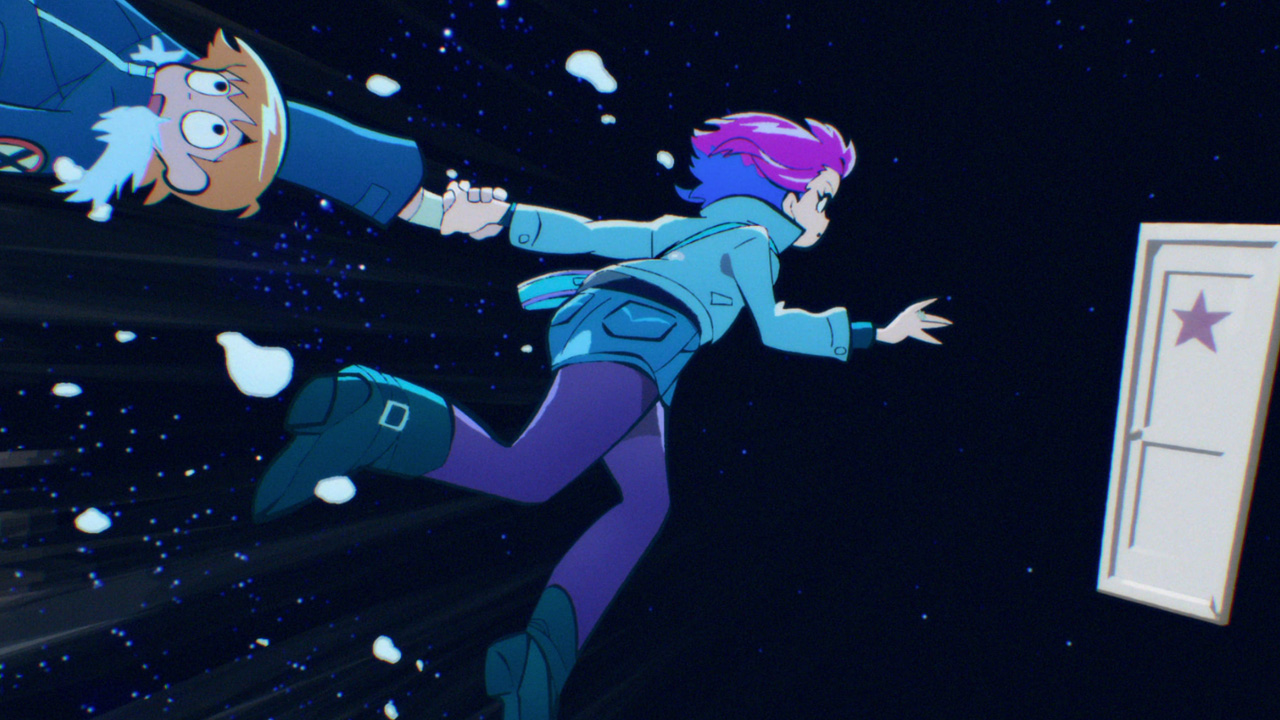Scott Pilgrim Takes Off offers a wild and imaginative spin on its source material

We’re all drowning in content—so it’s time to highlight the best. In her column, published every Friday, critic Clarisse Loughrey recommends a new show to watch. This week: the new new screen adaptation Bryan Lee O’Malley’s hipster comic, Scott Pilgrim Takes Off.
How many times are we willing to consume the same story in different guises? It’s the question that’s raced ahead of Scott Pilgrim Takes Off, Netflix’s new anime adaptation of Bryan Lee O’Malley’s comic series, about a hapless Toronto dweeb who bags his dream girl—only to be informed he first has to defeat her seven evil exes in Mortal Kombat-style showdowns. This, now, is the third adaptation to make its way to screens, following Edgar Wright’s nerdquake-triggering 2010 film and its accompanying Ubisoft game, a four-player side-scroller indebted to the 8-bit and 16-bit classics.
It’s been just over a decade since Wright’s film, which is the sort of anniversary that makes you feel old before it makes you feel nostalgic. So, it’s hard to grasp what compelled Netflix to commission a new series beyond the opportunity to recast Scott’s dream girl, Ramona Flowers, as a courier for its now-defunct DVD rental service, rather than the original Amazon.ca.
And, with the film’s entire cast—including Michael Cera, Mary Elizabeth Winstead, Aubrey Plaza, Brie Larson, and Chris Evans—reprising their roles, it’s reasonable to ask whether this is just the reverse-version (or Nega adaptation, if you will) of those pointlessly faithful live-action Disney films. Animation may open up a whole new world of visual possibility, but how much of an upgrade does that realistically offer? Is it the difference between putting your ready meal in the oven instead of the microwave?
I doubt the fans are particularly bothered. If you love something, you savour every little crumb of newness. But, for anyone else who was maybe questioning the existence of Scott Pilgrim Takes Off, allow me to offer a bit of advice: stick with it. The anime series, produced by Science Saru, certainly starts as a fairly exact replica of the comics, just as Wright’s film borrowed panel after panel. We see Scott (Cera) and his gay roommate Wallace Wells (Kieran Culkin) sharing a bed, as Scott argues that, really, the home Wallace pays sole rent for is just as much his, only for the camera to pan across and reveal that every bit of furniture in there is Wallace’s, not Scott’s.
It seems that all we gain here is that, when Scott first sees Ramona (Winstead) at a house party, she’s rendered with humongous, sparkly anime eyes. Then, without warning, everything changes. Netflix has expressly forbidden critics from revealing a single detail of how and where Scott Pilgrim Takes Off veers off from its source material, so I’ll do my best to be cryptic. As a whole, the series offers a wild and imaginative spin on a well-trod path. I don’t think it stands particularly well on its own, but it does position itself in surprising ways as a metaphorical sequel to both O’Malley’s comics and Wright’s film.
Having partnered with BenDavid Grabinski on the series’s script, O’Malley creates space for himself to interrogate his work. He was a guy, in his twenties, at a very specific time in culture, reflecting on the complexities of love and the gulf that can often exist between men’s ideas of women and the reality of who they are. It was a nuanced, but imperfect work, that I think has only become more imperfect as time has passed.

O’Malley addresses and rectifies some of his story’s issues—I hope Netflix would allow me to say this, but Scott Pilgrim Takes Off allows Ramona to shift into its centre, confront her baggage, and reveal herself to the audience as a fully formed person, not someone refracted through Scott’s daydreams. At the same time, O’Malley also indulges in all the best parts, which means a lot more Wallace Wells. Because, truly, who doesn’t love Kieran Culkin being deadpan and chaotic?
Science Saru have their fun, too, and the fight scenes are expanded, embellished, and animated with real imaginative thrill and scope. Pop culture references become the bread and butter of Scott Pilgrim Takes Off, but are so varied in their inspiration that they never grate. Stephen Sondheim gets his moment, and there’s a joke about how anime will happily stretch an enemies-to-friends plot line across 12 seasons.
It’s an ideal way to cash in without selling out. Yes, it’s an exercise in familiarity (don’t worry, they sneak in a “bread makes you fat” reference), but it’s also a project that’s been turned inside out and placed under a microscope, examined now with added maturity and wisdom. And also with, like, a lot more Aubrey Plaza saying bleeped-out swear words.

















